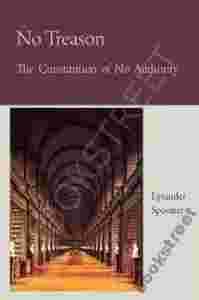|
2010 Reprint of the original 1870 edition.
Paperback 55pp. Lysander Spooner (January 19, 1808 - May
14, 1887) was an American anarchist, entrepreneur,
political philosopher, abolitionist, supporter of the
labor movement, and legal theorist of the nineteenth
century. He is also known for competing with the U.S.
Post Office with his American Letter Mail Company, which
was forced out of business by the United States
government. He has been identified by some contemporary
writers as an anarcho-capitalist, while other writers
and activists are convinced by his advocacy of
self-employment over working for an employer for wages,
that he was an anti-capitalist or a socialist,
notwithstanding his support for private ownership of the
means of production and a free-market economy. No
Treason has it origins in The Union government's actions
during the Civil War. In response, Spooner published one
of his most famous political tracts, No Treason. In this
lengthy essay, Spooner argued that the Constitution was
a contract of government which had been irreparably
violated during the war and was thus void. Furthermore,
since the government now existing under the Constitution
pursued coercive policies that were contrary to the
Natural Law and to the consent of the governed, it had
been demonstrated that document was unable to adequately
stop many abuses against liberty or to prevent tyranny
from taking hold. Spooner bolstered his argument by
noting that the Federal government, as established by a
legal contract, could not legally bind all persons
living in the nation since none had ever signed their
names or given their consent to it - that consent had
always been assumed, which fails the most basic burdens
of proof for a valid contract in the courtroom. Spooner
widely circulated the No Treason pamphlets, which also
contained a legal defense against the crime of treason
itself intended for former Confederate soldiers (hence
the name of the pamphlet, arguing that "no treason" had
been committed in the war by the south). These excerpts
were published in DeBow's Review and some other well
known southern periodicals of the time.
|
|

